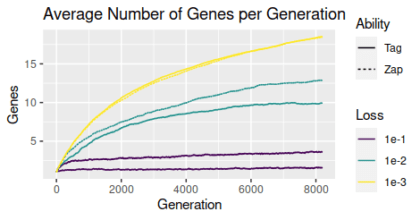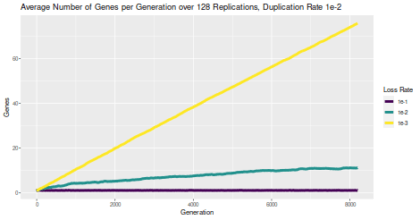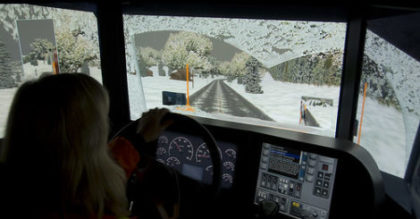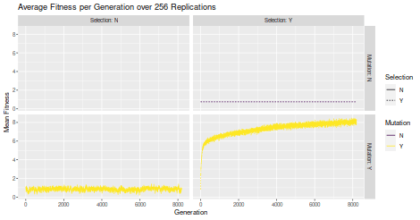Last week, we talked about gene duplication and looked at some simulation results. For starters, I was just simulating a random walk in the number of genes. The probability of adding a gene (taking a step 'up') remained the same, but I varied the probability of losing a gene (taking a step 'down'). And I prevented the number from ever getting to zero or lower. You can see the results to the right (click for a bigger version). When the probability of losing a gene is 10x higher than gaining (purple/darkest line), the … [Read more...] about Science Corner: Better with Friends?
artificial life
Science Corner: Better with Friends
Over the weekend, our household reached the point where all of us are fully vaccinated for COVID-19. We celebrated this milestone with an escape room outing. That got me thinking about my little escape room model, the Quandary Den. You can read more details here`, but the short version is that the Quandary Den simulates a game where a player has to "solve" the challenge of the room. My family's in-person escape room involved lots of combination locks, and here on the blog we simulated some password challenges of a … [Read more...] about Science Corner: Better with Friends
Science Corner: Unstuck in Neutral
Previously in the Quandary Den, I gave you a chance to do some evolutionary artificial life experiments for yourself. I hope you got an opportunity to at least run a couple of different rounds with the simulation. As I mentioned last week, I think simulations like this are a good way to gain experience and build intuition for phenomena we can't otherwise engage with in daily life. Few of us get to do evolutionary biology in the lab or the field, and some experiments are not possible for anyone due to pragmatic or … [Read more...] about Science Corner: Unstuck in Neutral
Science Corner: Learning by Simulating
Last week I introduced you to my escape room/dungeon crawling/superhero training simulation and a few basic results. I don't want to keep all the fun for myself, so now it's your turn. I like being able to program so I can make little models and simulations and get "hands-on" with equations and abstract concepts. Some people can look at an equation and understand how changing different parameters will change the results. If there are just two variables, a graph might work. But if there are additional variables or … [Read more...] about Science Corner: Learning by Simulating
Science Corner: Life Finds a Way Out
What do you with a biologist who isn't great with living things? In the lab, I tended to kill what needed to stay alive and cultivate contaminating microbes in places that needed to be sterile. Fortunately, I have a knack for getting computers to do what I want. And since evolution has an exploration-with-feedback problem-solving method at its core, it adapts well to computers. Computer scientists, engineers, designers and even artists and musicians have employed problem-solving techniques inspired by biological … [Read more...] about Science Corner: Life Finds a Way Out




